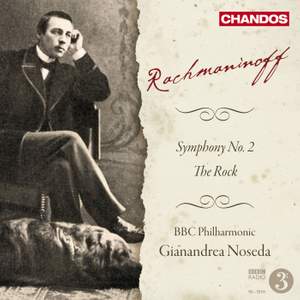Under Gianandrea Noseda, the BBC Philharmonic’s epic Rachmaninoff series continues with a recording of Symphony No.2, coupled with The Rock.
Unlikely his First Symphony, Symphony No.2 is standard orchestral repertoire. A recent concert at the Bridgewater Hall, elicited the review, ‘Noseda showed his remarkable affinity with Rachmaninoff’s style. He combines an ability to sustain the long structures of its emotional climaxes with a vocalistic approach to phrasing which lifts the tunes out of the texture and lefts them sing. It’s almost operatic in its vividness.’ City Life.
The challenge of making his mark with that ultimate big statement, a symphony, still faced Rachmaninoff as he headed into his mid-thirties. Posterity now accepts that he had probably cracked a tough nut with his First Symphony (CHAN 10475). Yet the 1897 premiere, poorly conducted under disputed circumstances by Glazunov, was so unfavourably received that it forced Rachmaninoff into creative silence for the next three years. Rachmaninoff’s Second Symphony was drafted alongside an equally ambitious Second Piano Sonata in a charming garden villa in Dresden, where the whole family had settled in late 1906. The finished product turned out to be one of the longest of all Russian symphonies. Breadth, though, is of the essence of the Second Symphony’s wealth of lovingly wrought and subtly interlinked thematic material. As one critic observed at the 1908 St Petersburg premiere, conducted with his usual first-rate flexibility by Rachmaninoff, ‘the new E minor Symphony… may be slightly over long for the general audience, but how fresh, how beautiful it is’.
The accomplished fantasia of 1893, The Rock offers an excellent example of Rimsky-Korsakov’s orchestration as acknowledged by Rachmaninoff’s original dedication.





